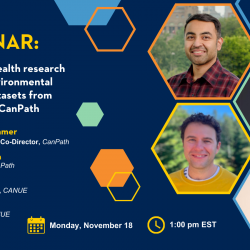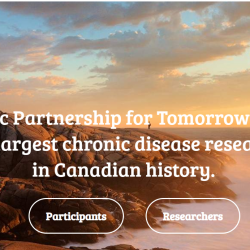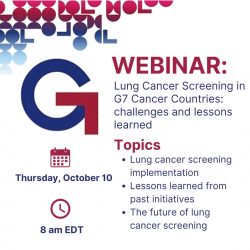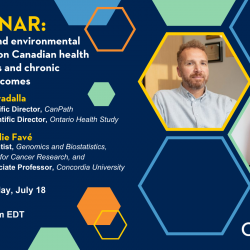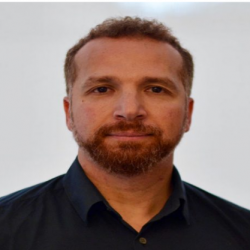Enhancing health research with new environmental exposure datasets from CANUE and CanPath November 18, 2024, 1-2pmEST/2-3pmAST Register: https://canpath.ca/2024/10/enhancing-health-research-with-new-environmental-exposure-datasets-from-canue-and-canpath/ CanPath is expanding its collaboration with the Canadian Urban Environmental Health Research Consortium (CANUE) by adding 17 new environmental exposure datasets to its existing data resources. CANUE provides standardized, area-level data on air and noise pollution, green spaces, climate change, and socioeconomic factors, linked to health cohort studies using participant residential postal codes. This webinar will introduce researchers to these new datasets, which include comprehensive measures of green spaces and vegetation (e.g., NDVI, Landsat, MODIS), air quality (PM2.5, smoke exposure), accessibility and transportation, and socioeconomic conditions. These data will be integrated with CanPath’s national harmonized dataset, providing researchers with a unique opportunity to explore the intersection of environmental exposures and health outcomes. The session will highlight practical examples of how these datasets can be utilized in studies focused on chronic diseases, cancer, and environmental health, offering researchers powerful tools to examine the spatial dimensions of health determinants. Additionally, we are pleased to share the upcoming release of Understanding Cancer Prevention through Geospatial Science: Putting Cancer in its Place, edited by one of our presenters, Dr. Trevor Dummer. The book discusses how geospatial science can support cancer prevention, featuring CanPath and CANUE in one of its chapters. Who should attend? Health and environmental researchers Epidemiologists Data scientists Public health professionals This webinar is an essential opportunity for researchers looking to expand their toolkit for investigating the impact of environmental exposures on health, utilizing rich, nationally harmonized cohort data. About the presenters Dr. Trevor Dummer Dr. Trevor Dummer, a health geographer with a PhD in Environmental Epidemiology from Newcastle University, has made significant contributions to cancer research and prevention. He joined CanPath in 2008 as the Research Director and later Co-Principal Investigator of Atlantic PATH. He was the Co-Scientific Director of the BC Generations Project (2015-2021). He has been the National Scientific Co-Director of CanPath since 2018. Holding the Canadian Cancer Society Chair in Cancer Primary Prevention, Dr. Dummer also serves as a Professor at the School of Population and Public Health, University of British Columbia (UBC). His research delves into the impact of environmental, community, and neighbourhood factors on health, specifically focusing on cancer prevention through community knowledge translation and studying the links between cancer and environmental exposures like radon and arsenic, as well as obesity and the built environment. Sheraz Cheema Sheraz Cheema has been CanPath’s Data Manager and part of the CanPath Access Office since January 2023. He supports data requests from national and international researchers, manages CanPath research data, generates datasets for approved projects, develops and maintains components of data auditing programs for quality assurance purposes, and provides consultative advice on data requirements. Prior to CanPath, Sheraz worked as a Research Analyst at the Centre for Addiction and Mental Health (CAHM). He holds degrees in neuroscience and health informatics. Dany Doiron Dany Doiron has been the Managing Director of CANUE since March 2022. Prior to this, he acted as Data Linkage Lead and Special Projects Manager (June 2016 – March 2022). Under his leadership, CANUE data have been integrated with all of Canada’s large cohorts and many provincial administrative health data organizations, providing one-stop research approvals. Dany is also a Research Associate at the Respiratory Epidemiology and Clinical Research Unit of the McGill University Health Centre in Montreal, Canada, and acts as the Chief Operating Officer of the Canadian Cohort of Obstructive Lung Disease (CanCOLD), a large population-based cohort dedicated to better understanding Chronic Obstructive Pulmonary Disease (COPD). Dany holds a PhD in Epidemiology and focuses his research on the respiratory health impacts of ambient air pollution exposure. Joey Syer Joey Syer has been the CANUE Data Director since November 2022. He oversees the development of CANUE datasets and projects dedicated to their improvement in epidemiological research. Joey is also a part-time course instructor at the University of Victoria in Population Health and Geographic Information Systems (GIS), and Spatial Epidemiology and Outbreak Detection. Prior to CANUE, he spent 10 years (2012-2022) as a geomatics specialist at Hemmera, an Ausenco Company. Joey holds degrees in GIS and Epidemiology. He has a strong interest in environmental epidemiology, using GIS, remote sensing, and machine learning to improve environmental exposure data quality, and a wide range of health outcomes.



